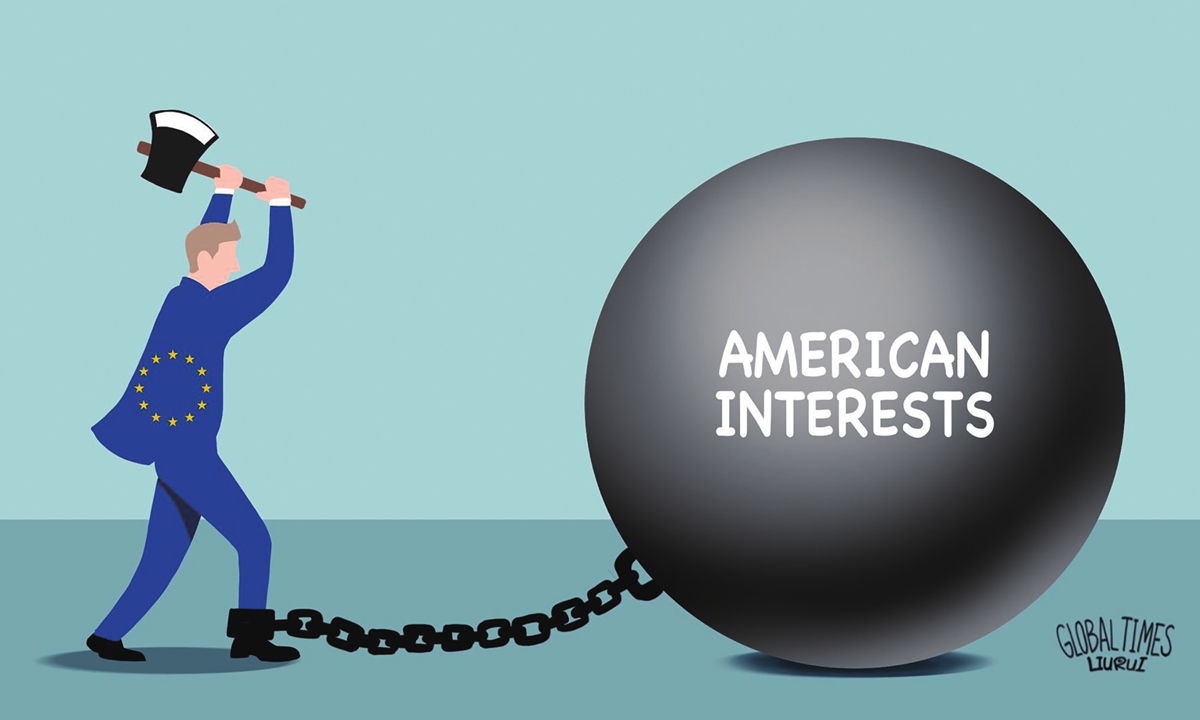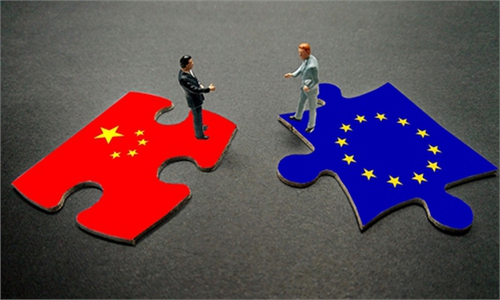
Illustration: Liu Rui/GT
The divisions within Europe when it comes to how to deal with China economically have never been so stark. While some European politicians appear to have hardened their China stance by putting forward the need to "de-risk" their economic ties with China, their companies are busily ramping up investment in China. Such a profound contradiction is a reflection that it is not easy for Europe to "decouple" from China despite all the distractions and challenges from such aspects as geopolitics and increased market competition.
Europe's largest asset manager Amundi is moving out of US assets in favor of China, attracted by the country's brighter economic prospects, better valuations and a more benign outlook for inflation, the Financial Times reported on Friday.
"In our allocations we have made a clear shift from west to east," Vincent Mortier, chief investment officer of the Paris-based fund firm, said in an interview with the Financial Times, predicting that the US economy will not grow next year while China, India and Indonesia will each grow by 5 to 6 percent.
Amundi is just one of many European companies that have chosen to strengthen investment in the Chinese market. The development comes against the backdrop of some European politicians and media outlets playing up "de-risking" in cooperation with China, calling for a reduction of a so-called dependence on China. Apparently, such voices are not shared by the business community in Europe, as they prefer to make decisions based on their own needs and development, with no regards of unrealistic political hype about "de-risking."
Take Germany as an example. German companies are still increasing investment in China even as some EU leaders seek to "de-risk" their relationship with China. German investment in China grew by nearly 61 percent in the first quarter from a year ago, according to data from China's Ministry of Commerce. Overall, foreign investment in China grew by 4.9 percent year-on-year in the first three months of the year to 408.45 billion yuan ($59.33 billion).
Just last week, BMW announced that it will produce its new class of electric vehicles in China as well as Europe from 2026, requiring an investment of around 1.3 billion euros ($1.4 billion), Reuters reported. Last month, Volkswagen announced at the Shanghai auto show that it is investing around 1 billion euros in an electric car development and business center in China, according to media reports.
The choice of European companies makes perfect sense. China is one of world's biggest markets with absolute certainty in driving an economic recovery this year. Those who invest in China will certainly enjoy strong dividends in the end. Moreover, China also has lots of skilled workers, comprehensive industrial chains, and sufficient and low-priced energy supplies. At a time when Europe's economy is struggling, China's advantages are hard for companies to resist.
Of course, this does not mean that European companies will not face any difficulty in investing in China. In fact, the challenges they face are serious and come from multiple fronts, such as the increasingly fierce competition due to the rising strength of Chinese rivals, geopolitical pressure from the EU's "de-risking" push, the risks triggered by their governments' strategic adjustment in China policy, and the difficulties in struggling for an edge in the Chinese market, among others.
But European companies have no choice but to move forward when it comes to exploring the Chinese market. This is because an exit of the world's most promising market represents a choice of surrendering to failure. There is no way they can find a substitute for China's market anywhere else in the world. Therefore, it is a must for European companies to consolidate their shares in the Chinese market by competing with local rivals and seeking cooperation and technological upgrading.
China has been supportive of cooperation with Europe, and European brands still have an edge and enjoy good reputation among Chinese customers. There is every reason to believe that European companies have realized the importance of the Chinese market in economic terms, especially amid growing uncertainties for the EU economy.



